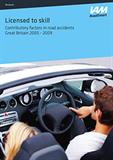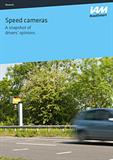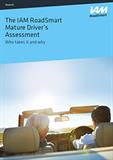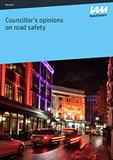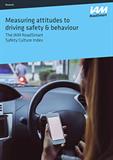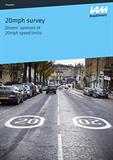-
Driving Safety Culture Survey 2021
This is our seventh annual report on the opinions, attitudes and behaviour of British drivers, showing that the main worries of British drivers have remained remarkably consistent over time – even during the recent pandemic. With 2000 respondents this is one of the biggest annual opinion surveys on road safety run in the UK
More information -
Older Drivers 2021
More and more Britons are living longer and healthier lives but, as this report finds, the car is still by far the most popular transport option for them and one they are not keen to give up. This report looks at the attitudes of older drivers regarding themselves, their peers, and ways to increase the safety of older drivers.
More information -
Drivers opinions' of 20mph speed limits
This is the second report conducted by IAM RoadSmart on UK motorists' attitudes towards 20mph limits and road safety. This survey was first carried out in 2014 and this report is a repeat of the survey conducted in April 2021 and includes statistically valid differences from the previous survey.
More information -
Driving Safety Culture 2020
IAM RoadSmart’s sixth annual Safety Culture Survey explores the opinions, attitudes and behaviours of UK drivers and specifically examines changing concerns over time. The 2020 survey shows that, even in a year dominated by COVID-19, drivers still felt concerned over key threats to their safety when out on the road. In this year's report, potholes are considered the biggest growing issue compared to three years ago, with driver distraction and traffic congestion close behind.
More information -
Evaluation of Advanced Motorcycling 2020
IAM RoadSmart's new study has found that motorcyclists who have taken the Advanced Rider course have safer attitudes on the roads and are involved in fewer collisions per mile than riders who have not completed advanced rider coaching. Conducted by leading research company Agilysis, the survey of c. 1,300 riders, including IAM RoadSmart members and non-advanced qualified motorcyclists, also revealed that advanced riders are more aware of the limitations of other drivers and riders and are therefore more likely to show consideration for their fellow road users. You can read the full findings by clicking on 'More information' below.
More information -
Driving Safety Culture Survey 2019
IAM RoadSmart’s fifth annual Safety Culture Survey examines the attitudes and concerns of UK drivers, tracked year-on-year to monitor change. The 2019 survey shows that, for the fifth year running, drivers' biggest concerns are congestion and the danger of distraction when phones are used behind the wheel.
More information -
Infotainment - The Impact of interacting with Android Auto and Apple CarPlay when driving
Worrying results from a new study by road-safety charity IAM RoadSmart released today show that the latest in-vehicle infotainment systems, which are designed to improve road safety, are failing and are in fact impairing reaction times behind the wheel – even more so than alcohol and cannabis use.
More information -
Driving Safety Culture Survey 2018
IAM RoadSmart’s fourth annual Safety Culture Survey examines the attitudes and concerns of UK drivers, and has found once again that their biggest worries revolve around the many uses that people have developed for smartphones when they should be driving.
More information -
Young Novice Driver Collision Types
A new report by the UK’s leading road safety charity IAM RoadSmart and TRL into crashes involving young drivers has concluded that they need to learn quicker how to avoid crashes with the most vulnerable users on our roads.
More information -
Driving Safety Culture Survey 2017
IAM RoadSmart’s third annual Safety Culture Survey which examines the attitudes and concerns of UK drivers, has found that for the third year running their biggest worries are people updating social media or sending text messages while driving, drink or drug driving and mobile phone use.
More information -
The battle for attention
Driver distraction is a contributory factor among many vehicle collisions. But what are the factors responsible and how do they impact the behaviour of different road users?
More information -
Evaluating the costs of incidents from the public sector perspective
Our new report, Evaluating the costs of incidents from the public sector perspective, is the first attempt to update the formula for death and injury cost figures since the 1990’s. It is also the first time anyone has highlighted the costs to the public sector of crashes involving some of the highest at-risk road user groups: young and mature drivers, people driving for work and motorcyclists.
More information -
Keeping Older Drivers Safe and Mobile: A Survey of Older Drivers
Dr. Carol Hawley of the University of Warwick has surveyed more than 2,600 drivers and former drivers to gain fresh insights on their opinions, habits and motoring history.
More information -
Cognitive behaviour therapy - a stress buster for motorcyclists?
How can cognitive behavioural therapy help to protect motorcyclists on the road.
More information -
Don't Poke me I'm Driving!
IAM RoadSmart commissioned the simulator experts at TRL to study the effect on driving of smartphone use
More information -
IAM RoadSmart Safety Culture Survey 2016
IAM RoadSmart’s Safety Culture Survey was produced for the first time last year, and looks at UK motorists’ safety attitudes and behaviour and has just been updated for 2016.
More information -
Evaluation of Advanced Driving
We commissioned independent researchers Hopkin and Sykes to carry out an Evaluation of Preparation for the IAM Advanced Driving Test. They analysed survey results from over 2,500 members and held discussions with selected participants. Nearly all felt, safer, more confident and enjoyed their motoring more after the course.
More information -
The ageing process and driver safety
This study was commissioned from TRL and used their world renowned simulator technology to answer the question - why do older drivers have more 'failed to look' crashes?
More information -
Older drivers - safe or unsafe?
Older drivers are one of the safest groups on our roads but government policy needs to be reviewed to deal with the ever increasing numbers. Over the next 30 years the number of over 70s will increase substantially, as will those driving – the number of male drivers over 70 on the roads will double, and the number of women drivers will treble.
More information -
IAM novice driver market research 2007
A market research survey of the young driver market
More information -
Crash barriers - is poor design killing motorcyclists?
Crash barriers can be life savers for motorists, but can be killers of motorcyclists. This report highlights the need for better design and investment in mass action programmes to prevent avoidable injuries to motorcyclists.
More information -
IAM cycling motorists - 2009
Motorists who cycle hold the key to less congestion, better health and less pollution. This report identifies the enormous potential for many more motorists to take up cycling either for leisure or to replace some car journeys.
More information -
IAM motorcyling facts - 2009
A compendium of motorcycling facts and figures from 2009
More information -
IAM riders motorcycling simulator report
This 2010 project used a world leading motorcycle simulator to analyse rider behaviour and proved that safer doesn’t necessarily mean slower and that formal advanced training for bikers does improve their safety on our roads.
More information -
Rural roads - the biggest killer?
A ground-breaking report published in 2007 which highlighted the toll of death and injury on rural roads
More information -
Transforming Riding: An Evaluation of Advanced Motorcycling
Improving the safety image of motorcycling is a key component in promoting its role as a solution to congestion and other transport problems. It is clear that the IAM approach works but we need the support of central and local government, the emergency services and other agencies to promote our message to as many bikers as possible.
More information -
Licensed to skill: contributory factors in road accidents
Driver or rider error is the main factor in many road traffic accidents in the UK. But why is this and what can we do to reduce deaths and serious injuries on our roads?
More information -
Speed cameras: A snapshot of public opinion
What do drivers really think about speed cameras? The results of our survey may surprise you.
More information -
Mature driver assessment
We asked the drivers on our Mature Drivers’ Assessment course about their experiences and why they signed up.
More information -
Councillor's Opinions on Road Safety
Local councillors have an important role in shaping our roads and improving safety. But what do they really think and what are their priorities for change?
More information -
Measuring attitudes to driving safety and behaviour
What do drivers think about the issues influencing road safety? And how do these attitudes correspond with their behaviour on the road?
More information -
20mph survey: Drivers’ opinions of 20mph speed limits
We asked 1,000 drivers for their thoughts on 20mph speed limits and the implications on road safety.
More information -
The fast and the curious: The IAM and young drivers
The over-representation of young drivers in road accidents is well known and widely reported. Thirty per cent of car occupant fatalities are drivers aged 17-24, or passengers of a driver aged 17-24. Yet this group only forms eight per cent of all license holders.
More information -
Social impact evaluation using social return on investment
The results of this work are striking, not only because of the significance of the value that the IAM achieves for society, but also for the human consequences of the IAM‟s work: improving the safety of drivers through the advanced test, corporate driver training and the use of research to influence policy is saving lives.
More information
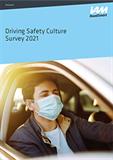
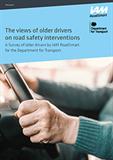
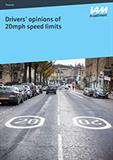
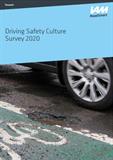
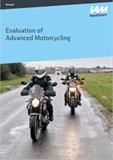
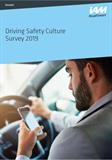
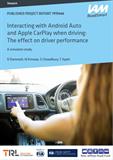

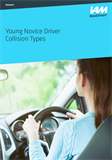

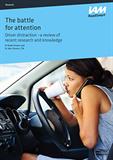
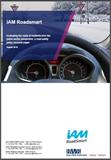
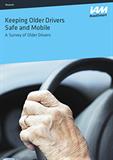
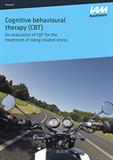

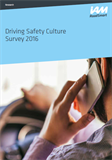




.tmb-lstitmimg.jpg?sfvrsn=74d6fa50_4)




